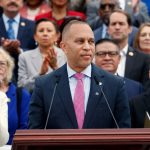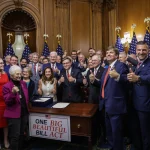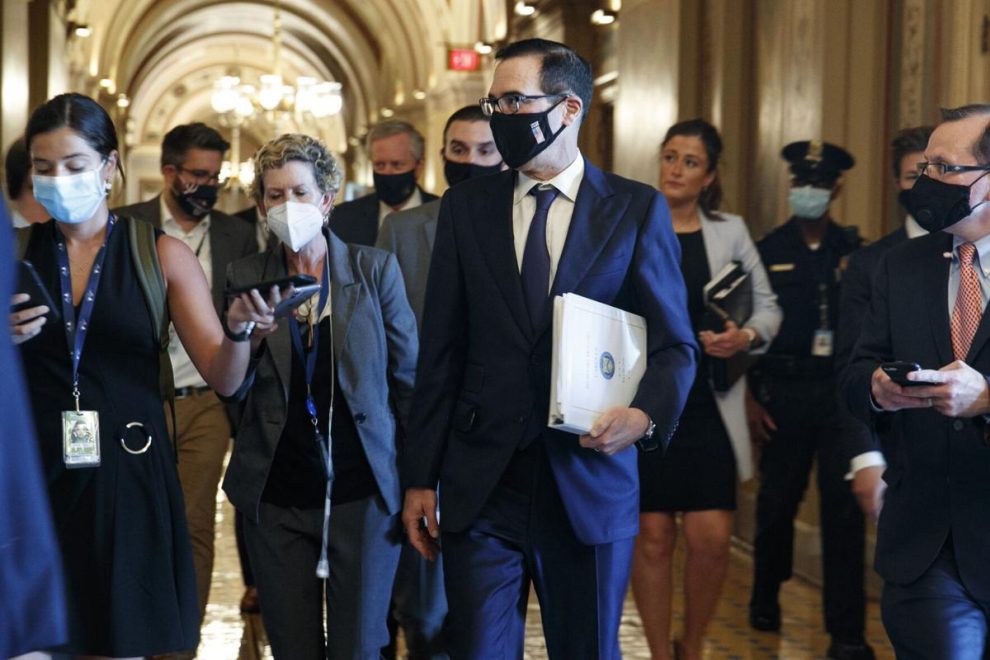Senate Republicans unveiled a roughly $1 trillion coronavirus relief package Monday, paving the way for negotiations with Democrats.
The legislation caps off days of behind-the-scenes negotiations and public infighting as a group of GOP negotiators and administration officials tried to line up on key provisions.
Senate Majority Leader Mitch McConnell (R-Ky.) said the package represents a “realistic” proposal for what would be “appropriate” to add to the country’s debt.
“We think it is about $1 trillion, and we’ve allocated what we think makes the most sense for the country at this particular time,” McConnell told reporters.
Large portions of the bill were already known: $16 billion in new funds for coronavirus testing, $105 billion for schools, and a five-year shield from coronavirus-related lawsuits unless an entity — such as a business, school or government agency — engaged in “gross negligence” or “intentional misconduct.”
The measure will also provide a second round of stimulus checks. Similar to the CARES Act from late March, it would give a payment to those making up to $75,000 a year. That amount scales down until it hits an income ceiling of $99,000, where it phases out altogether.
For small businesses, the legislation provides another round of loans under the Paycheck Protection Program but requires businesses to have lost at least 50 percent of their revenue to be eligible. The revised program also would limit participation to firms with no more than 300 employees, compared with the 500-employee cap from earlier this year.
One of the final issues worked out between congressional Republicans and the White House was how to replace a $600-per-week increase of unemployment benefits, which was included in the CARES Act and began expiring over the weekend.
Talks over the language went down to the wire, with White House economic adviser Larry Kudlow telling reporters earlier Monday that things were still being hammered out.
“These are technical adjustments to the formulas,” he said. “They’re in final discussions as we talk.”
Republicans are proposing a transition to unemployment benefits that would match roughly 70 percent of an individual’s previous wages.
Negotiators discussed trying to tie the jobless benefits in March to 100 percent of a person’s wages before they were laid off but were told by the Labor Department that antiquated systems in state unemployment offices would not be able to handle that kind of switch.
Treasury Secretary Steven Mnuchin and White House chief of staff Mark Meadows said they’ve been working with Labor Secretary Eugene Scalia to iron out the mechanical difficulties to a scalable wage replacement. But states have warned that it could take weeks and in some cases months to transition.
Under the GOP bill, states would have two months to make the switch from a flat amount to scaling based on an individual’s previous wages. During that transition period, the $600-per-week federal benefit would be cut to $200 a week. Once states incorporate the new formula, the federal employment benefit would be capped at up to $500 per week. The state unemployment benefits and federal assistance would be combined to equal roughly 70 percent of an individual’s previous wages.
The bill’s unveiling comes after Republicans had to punt last week while they haggled with the White House over details of the package. Meadows and Mnuchin made rare back-to-back weekend trips to the Capitol on Saturday and Sunday to meet with Senate GOP leadership staff. No senators were present for those talks.
Meadows said Sunday night that they were down to closing out a handful of issues and that he still anticipated the GOP proposal would be released Monday.
The talks have been beset by high-profile fights within the GOP caucus, as several conservative and libertarian-minded senators blasted their colleagues for their willingness to consider another coronavirus spending package. McConnell set the top-line price tag for the bill at $1 trillion in what was viewed as an attempt to lessen criticism from fiscal hawks.
Sen. Lindsey Graham (R-S.C.) predicted during an interview with Fox News that the bill would face serious GOP defections.
“Half of the Republicans are going to vote no,” he said. “That’s just a fact.”
Republicans are expected to start formal negotiations with Democrats this week, with the talks, similar to previous bills, likely playing out by having Mnuchin and Meadows shuttle between leadership offices.
House Democrats previously passed their own $3 trillion bill in May that included new money for state and local governments and food assistance funding and continued the $600-per-week unemployment enhancement through the end of the year.
They’ve decried the Republican bill as unlikely to meet the country’s needs as coronavirus cases climb and the economy remains rocky. Senate Minority Leader Charles Schumer (D-N.Y.) and House Speaker Nancy Pelosi (D-Calif.) are meeting with Mnuchin and McConnell on Monday night to start the talks.
“Leader McConnell, sitting in your own office, writing a bill and then demanding the other side support it is not anyone’s idea of bipartisanship. And even worse, it appears that the developing Republican proposal is really unlikely to meet the moment,” Schumer said last week.
Story cited here.
























